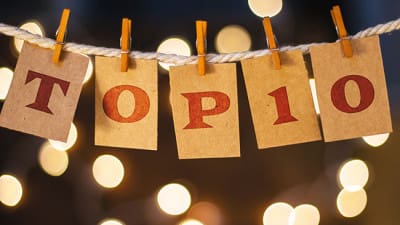As you face interviews or settle into a new job, you’re going to hear words and phrases you’ve never heard before. Or maybe you’ve heard them, but still don’t know what they mean.
The marketing industry is one of the worst offenders when it comes to buzzwords. So how do you separate terms you’ll carry with you from what’s just trendy at the moment? Here are a few words you’ll hear over and over and absolutely need to know, and samples of how you’d use it in a sentence.
Also on Mediabistro


1. Conversion Rate: The percentage of users who take the action you want them to take, like signing up for your craft beer newsletter or buying a pair of stylin’ new kicks.
Sample Sentence: “Our website, MakeBeerAtHome.com, had 10,000 visitors last week, and 1,000 purchases of our home brew kits, making the conversion rate 10%. Cheers!”
2. CRM: Customer relationship management, or the practices, strategies and technologies used to manage and analyze interactions and data to respond to customer needs and wants. If a customer tells a sales rep they think a product is too expensive, that may trigger an email with a discount code for their next purchase.
Sample Sentence: “Through customer feedback, we’re seeing our customers find our jars of honey too difficult to open, so—as a CRM tactic—we’re going to start including a jar opener with each order along with a note that reads, “don’t feel bad, we can’t open ’em either!”
3. Earned Media: Consumers, press or other members of the public who share your content voluntarily. For example, when a news station features a new dating app on a morning show or a blogger writes about the best pair of jeans they’ve ever bought just because they love them so much.
Sample Sentence: “Traffic to the company’s blog last month exploded thanks to earned media—the cat video got 300 shares on Facebook and 700 retweets!”
4. KPI: Key performance indicator, a metric that’s been identified as most important for your company. While key performance indicators are metrics, all metrics are not KPIs. And KPIs are different based on your business objectives.
Sample Sentence: “Since we’re such a new business, we should make social media follower growth a KPI, and maybe even measure the cups of coffee our social media manager drinks…since the numbers seem to correlate.”
5. Metric: Numeric data that allow marketers to evaluate performance of lead generating efforts and effectiveness of a channel or content. Some examples include cost per lead, click-through-rate, and site visits. Keeping track of these not only helps you make better decisions, but can also help prove your worth and validate what you’re doing.
Sample Sentence: “Using metrics like bounce rate and session length, we realized having a video of our CEO on our homepage giving his ‘why I do what I do’ speech was actually turning customers away.”
6. NPS: Net promoter score, a way to measure how people feel about your brand and the likelihood that they’d tell others about you.
Customers and prospects fill out a survey and choose on a scale of 1 to 10 to gauge how likely they are to recommend your product or service. The score is calculated by subtracting the percentage of customers who choose 0 to 6 (would not recommend), from the percentage who chose 9 to 10 (would recommend).
Sample Sentence: “Looking at the NPS, it seems users like our brand’s makeover and would recommend our product to friends. Phew!”
7. Owned Media: Platforms you manage and control, such as a company blog or Facebook page.
Sample Sentence: “With our social team tackling Facebook and Twitter, and our content team rocking the blog, we are OWNING our owned media!”
8. Paid Media: Paying to leverage a third-party channel through sponsorships or advertising. This includes traditional advertising like a TV spot, direct mail, or magazine ad, as well as PPC ads, Facebook ads or sponsored blog posts.
Sample Sentence: “We’ve gotta free up some of the marketing budget; the brand knows paid media will be very important when they launch a new product since no one has ever heard of it before.”
9. PPC: Pay-per-click, an online advertising method used to direct traffic to websites. You only pay when the ad is clicked. PPC ads complement other search engine optimization efforts and are great for promoting sales, seasonal promotions, or the launch of a new product.
Sample Sentence: “Make some time in your afternoon: The marketing director wants to revisit the messaging for a PPC ad since the click-through rate is lower than other ads based on the same keywords.”
10. Persona: A profile of a representative customer that describes purchase behavior, goals, skills, attitudes and other details that make the target consumer more realistic for the marketing team. Everyone from media planners to designers refer to personas when making decisions about their work.
Sample Sentence: “Our persona of a young woman who loves food and photography inspired a series of blog posts and videos about how to take better pictures of your food photos without annoying your hungry dining companions.”
11. Remarketing: Also called retargeting, this is an online marketing tactic that allows marketers to reach out via other channels to visitors who have previously visited their website.
Sample Sentence: “Hey, online sales increased by 30 percent last month; looks like remarketing to customers who’d left without buying a pair of shoes was a good call.”
13. ROI: Return on investment. Basically, this is how you tell if something was worth the time, resources and money spent. In cases where efforts may not be directly tied to sales, especially with content marketing and social media, you may have to evaluate non-monetary gains such as awareness or consumer insights.
Sample Sentence: “Sure, social media is expensive, but when you consider the value of the brand exposure, and the insights gleaned from customer feedback, the ROI is a no-brainer.”





